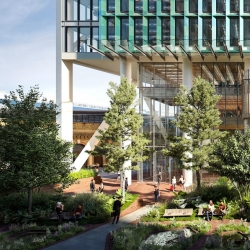October 26, 2022
World Green Building Council launches guide to climate change resilience
 The World Green Building Council (WorldGBC) has launched a new industry guide on ‘Climate Change Resilience in the Built Environment’, collating effective and practical steps that can be taken on a building, community and city scale in order to adapt and build resilience to the changing climate. Under the inevitable impacts of climate change, which are affecting at least 85 percent of the world’s population, bringing acute hazards such as droughts, rising sea levels, heat waves and floods increasing frequency and severity, resilience action is essential to build community capacity to survive and thrive in our built environments. (more…)
The World Green Building Council (WorldGBC) has launched a new industry guide on ‘Climate Change Resilience in the Built Environment’, collating effective and practical steps that can be taken on a building, community and city scale in order to adapt and build resilience to the changing climate. Under the inevitable impacts of climate change, which are affecting at least 85 percent of the world’s population, bringing acute hazards such as droughts, rising sea levels, heat waves and floods increasing frequency and severity, resilience action is essential to build community capacity to survive and thrive in our built environments. (more…)

























July 29, 2022
It should be much easier to identify genuinely green products
by Julie Hadley • Comment, Environment